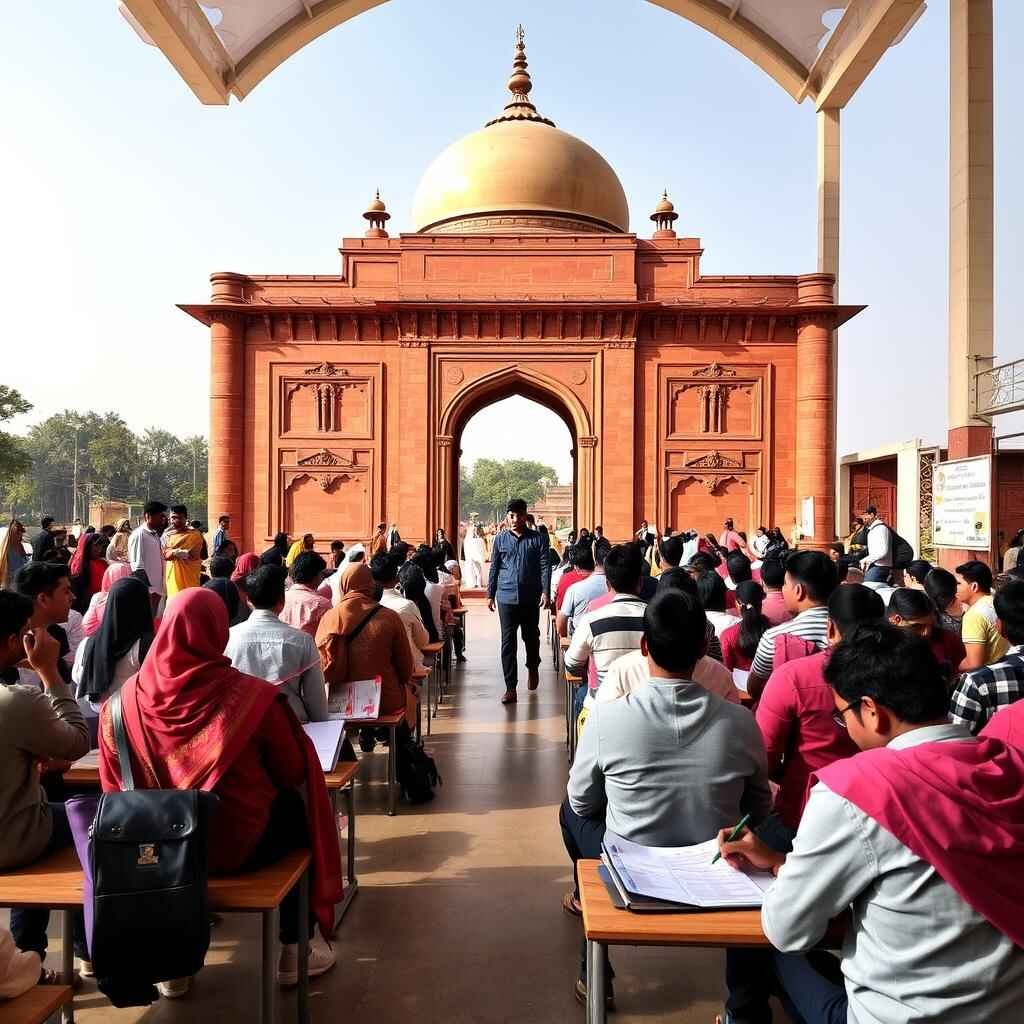SSC CGL vs. Bank PO: Decoding India’s Top Competitive Exams for Government Jobs-Unravel the differences between SSC CGL and Bank PO, two of India’s premier competitive exams. Learn about the exam patterns, career paths, and opportunities each offers to make the best career decision.
Table of Contents
Introduction
India’s competitive exams serve as the gateway to coveted government positions that promise job security, career advancement, and societal esteem. Among these, the Staff Selection Commission Combined Graduate Level (SSC CGL) and the Bank Probationary Officer (Bank PO) exams are particularly prominent. Both exams offer pathways to stable and rewarding careers, but they cater to different job profiles and career trajectories. This article delves into a thorough analysis of SSC CGL and Bank PO, highlighting their differences in exam structure, eligibility, and job roles, to guide aspirants in choosing the path that best aligns with their career goals.

Introduction to SSC CGL and Bank PO Exams
The Staff Selection Commission Combined Graduate Level (SSC CGL) exam and the Bank Probationary Officer (Bank PO) exam are two of the most competitive exams in India, both providing gateways to stable and prestigious government careers. These exams have their origins in India’s post-independence era, designed to recruit qualified individuals into various government departments and public sector banks. While SSC CGL is conducted by the Staff Selection Commission (SSC) to fill positions in various government ministries, departments, and organizations, the Bank PO exam is typically conducted by the Institute of Banking Personnel Selection (IBPS) and individual banks like SBI, aimed at recruiting Probationary Officers in public sector banks.
Syllabus and Exam Pattern
SSC CGL
The SSC CGL exam consists of four tiers:
1. Tier I: A preliminary exam with questions on General Intelligence & Reasoning, General Awareness, Quantitative Aptitude, and English Comprehension.
2. Tier II: A mains exam featuring four papers – Quantitative Abilities, English Language and Comprehension, Statistics, and General Studies (Finance and Economics).
3. Tier III: A descriptive paper to assess writing skills in English/Hindi.
4. Tier IV: A skill test (Data Entry Speed Test/Computer Proficiency Test) or document verification, depending on the post applied for.
Bank PO
The Bank PO exam typically has three stages:
1. Preliminary Exam: Focuses on English Language, Quantitative Aptitude, and Reasoning Ability.
2. Mains Exam: Includes Reasoning & Computer Aptitude, General/Economy/Banking Awareness, English Language, and Data Analysis & Interpretation. Some banks also have a descriptive test for essay and letter writing.
3. Interview: This is the final stage where candidates are assessed on their communication skills, personality, and suitability for the role.
Eligibility Criteria
SSC CGL
1. Nationality: Must be an Indian citizen.
2. Educational Qualification:
A bachelor’s degree from a recognized university or equivalent.
Some posts may have specific requirements (e.g., a degree in Economics for certain roles).
3. Age Limit:
Generally between 18 to 32 years, depending on the post.
Age relaxations apply for reserved categories as per government norms.
Bank PO
1. Nationality: Must be an Indian citizen.
2. Educational Qualification:
A bachelor’s degree from a recognized university or equivalent.
3. Age Limit:
Typically between 20 to 30 years.
Age relaxations apply for reserved categories as per government norms.

Recommended Books
SSC CGL
1. General Intelligence & Reasoning:
A Modern Approach to Verbal & Non-Verbal Reasoning by R.S. Aggarwal.
2. Quantitative Aptitude:
Quantitative Aptitude for Competitive Examinations by R.S. Aggarwal.
3. General Awareness:
Lucent’s General Knowledge.
4. English Language & Comprehension:
Objective General English by S.P. Bakshi.
Bank PO
1. Quantitative Aptitude:
Quantitative Aptitude for Competitive Examinations by R.S. Aggarwal.
2. Reasoning Ability:
A Modern Approach to Logical Reasoning by R.S. Aggarwal.
3. English Language:
Word Power Made Easy by Norman Lewis.
4. General/Economy/Banking Awareness:
Banking Awareness by Arihant Experts.
5. Data Interpretation & Analysis:
Data Interpretation & Data Sufficiency by Arihant Publications.
Note on Book Recommendations
The book recommendations provided are based on the most widely sold and popular choices available online. These books are generally well-regarded for their comprehensive coverage of the syllabus and effectiveness in preparing candidates for the exams. However, it’s important to note that there are other excellent books and study materials that may be recommended by local coaching centers or experienced educators. Additionally, as exam patterns evolve and new editions are published, the relevance of certain books may change. Candidates are advised to stay updated and consult additional resources as needed, particularly for specific posts or as exam requirements change over time.
Job Profile and Work Environment
SSC CGL
The jobs offered through SSC CGL vary significantly depending on the post, ranging from desk jobs in government offices to field jobs in enforcement agencies. Generally, these roles involve administrative work, data handling, and support in policy formulation. The work pressure is moderate, with regular working hours from 9:00 AM to 5:30 PM. The transfer policies depend on the department, with some posts requiring occasional transfers.
Bank PO
As a Bank PO, the job profile involves managing bank operations, customer service, loans, and financial planning. The work pressure in banking is comparatively higher due to the demanding nature of the job, including meeting targets and deadlines. Bank POs typically work longer hours, often extending beyond the usual 9:00 AM to 5:00 PM schedule, and transfers are common, particularly in the early years of the career.

Salary and Benefits
SSC CGL
The salary for SSC CGL posts varies depending on the job profile and the level of the post. Generally, the salary ranges from INR 35,000 to INR 55,000 per month at the entry-level, including various allowances like Dearness Allowance (DA), House Rent Allowance (HRA), and Travel Allowance (TA). Employees also enjoy benefits like job security, a pension, and numerous other perks.
Bank PO
The salary of a Bank PO is competitive, with entry-level salaries ranging from INR 35,000 to INR 45,000 per month, along with allowances such as DA, HRA, and medical benefits. In addition, Bank POs receive perks like concessional loans, leave travel concession, and more. The banking sector also offers opportunities for performance-based incentives.
Future Growth and Career Progression
SSC CGL
Career progression in SSC CGL jobs is relatively stable, with regular promotions based on experience and departmental exams. Growth can be slower compared to the banking sector, but the stability and job security are unparalleled. Employees can rise to senior positions in their respective departments, with chances of becoming Under Secretaries or even higher.
Bank PO
The banking sector offers faster career growth compared to SSC CGL jobs. A Bank PO can quickly move up the ranks to become a Branch Manager, Regional Manager, and even higher positions like General Manager or Director. However, the competitive nature of the job and the pressure to meet targets play a significant role in this growth.

Pros and Cons
Bank PO
Pros
1. Job Security: SSC CGL jobs offer a high level of job security as they are central government positions.
2. Diverse Job Profiles: There are a variety of job roles available under SSC CGL, ranging from desk jobs to field roles, offering options based on preferences.
3. Work-Life Balance: Generally, SSC CGL jobs have fixed working hours, which ensures a good work-life balance.
4. Less Transfer Frequency: Compared to Bank PO, SSC CGL jobs usually involve fewer transfers, particularly for desk jobs.
5. Growth and Stability: The roles provide stable career growth, with opportunities for promotions through departmental exams and seniority.
Cons
1. Slower Career Growth: Compared to Bank PO, promotions and career advancements can be slower in SSC CGL jobs.
2. Lower Initial Salary: The initial salary might be slightly lower compared to a Bank PO, especially in metropolitan cities.
3. Limited Public Interaction: For candidates seeking roles that involve a lot of public interaction, many SSC CGL posts are more administrative in nature.
Bank PO
Pros
1. Faster Career Growth: Bank POs generally experience quicker promotions, with opportunities to rise to senior management positions within a few years.
2. Higher Initial Salary: The starting salary for Bank POs is competitive, often with additional perks and bonuses.
3. Dynamic Work Environment: The banking sector is dynamic, with opportunities to learn and grow in various areas like finance, customer service, and operations.
4. Performance-Based Incentives: Banks often offer performance-based bonuses and incentives, which can significantly boost earnings.
Cons
1. High Work Pressure: Bank POs often face high work pressure, including meeting targets, dealing with customers, and handling large volumes of work.
2. Long Working Hours: Unlike SSC CGL jobs, Bank POs may have to work longer hours, especially during the financial year-end or special banking days.
3. Frequent Transfers: Transfers are more frequent in banking jobs, which can be challenging for those who prefer stability in location.
4. Less Work-Life Balance: Due to the demanding nature of the job, maintaining a work-life balance can be more difficult compared to SSC CGL jobs.

Conclusion
Both SSC CGL and Bank PO exams lead to rewarding careers in the public sector, but the choice between the two depends largely on individual preferences and career goals. SSC CGL is ideal for those who seek a stable government job with moderate work pressure and less frequent transfers, while Bank PO is suited for those who thrive in a dynamic and challenging environment with faster career growth. Aspirants should weigh the pros and cons of each career path based on their strengths, long-term goals, and work-life balance considerations.
Thank You Note
Thank you for taking the time to read this comparison between SSC CGL and Bank PO. We hope this information has provided clarity and helped you in making an informed decision about your career path. Best of luck with your preparations and future endeavors!
For more comparisons and insights, visit our blog regularly. If you have any questions or suggestions, feel free to leave a comment or contact us directly.
Frequently Asked Questions
What is the minimum educational qualification required for SSC CGL?
What are the age limits for Bank PO exams?
Which book is recommended for the Quantitative Aptitude section of the SSC CGL exam?
How many tiers are there in the SSC CGL exam?
What is the primary focus of the Bank PO interview stage?
Name a recommended book for General Awareness preparation for SSC CGL.
What is the maximum age limit for SSC CGL without any age relaxation?
Disclaimer
The information provided in this article is based on the latest available data and is intended for informational purposes only. Exam patterns, job profiles, and other details may vary over time, and it is advisable to refer to official sources for the most up-to-date information.
For more exciting topics, explore our other articles here
1. Comparison of Unique Cities of Rajasthan in India
2. Cricket Sports: Batting Players Comparison
3. Cricket Sports: Bowling Players Comparison
4. 10-Meter Pistol Shooting Players Comparison
5. For a detailed comparison between coffee and tea
6.Comparison between Maruti Suzuki vs Hyundai
7.Hotstar vs Amazon Prime Video
8.Xbox or PlayStation: Uncovering the Best Console for Gamers in 2024
2 Comments